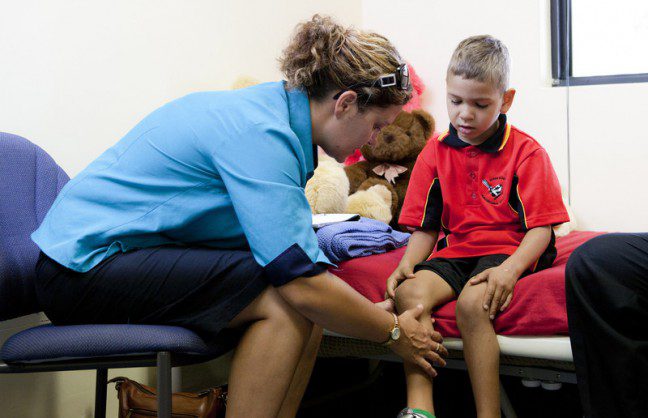South West Aboriginal Medical Service (SWAMS) is a Nyoongar Community Controlled Health Organisation based in Bunbury, Western Australia (WA). The organisation provides Indigenous communities across WA’s south west with culturally appropriate medical services while promoting a holistic approach to good health that draws from the best of Aboriginal and western practices.
While Oxfam is primarily involved with SWAMS through its healing circles, our Communications Editor Marion Reid met some members of the clinical team when she visited Western Australia recently. They spoke to her about the rewards and challenges of their work, their hopes for the future, and common health issues. Over the coming month, we’ll hear from a different Aboriginal health worker each week.
First up, we meet Katherine Naylor, a Wiradjuri woman born in Wagga Wagga, New South Wales.
Tell me a bit about your work. What do you do?
Katherine: I’ve been doing this position for 12 years now. I love my job. When I first came on board I was basically doing men’s health, women’s health, elderly health. You go out and you do health checks on clients … But I’m now working in child-maternal health.
The doctors refer mothers who are pregnant to us. We make sure they’re going to their appointments, they’re having all their blood work done, they’re under a doctor, they’re being booked in for their ultrasounds.
After they’ve had the baby we go and check how they’re going. We bring them into the clinic, as we were finding that a lot of our mums weren’t having their [babies’] immunisations because they didn’t have transport to get to their appointments. Since we sorted that out, we found that babies’ immunisation rates have picked up. So that’s really good and that’s been through SWAMS.
We ran a mum’s group in the past but we’ve actually had to stop that because we’re short-staffed at the moment. We just don’t have the health workers.
And they’re screaming out for them. We need to train more up … I know there are lots of Aboriginal people out there who would love to work within the community. But you know, it’s equivalent to a nurse so you can’t just apply for the job and have no skills … It would be good if we had the funding so we could train more Aboriginal people to become health workers. Because then we could do more good work.
Why is it so important to have Aboriginal health workers in Aboriginal community?
Katherine: Because we need to Close that Gap. We know statistically that our death rates are higher. We know there are issues with alcohol and drugs, but also diabetes, heart disease. The way I see it at the moment we’ve got too many chiefs and not enough Indians. We need more Indians. I’m not saying it’s not working but if we had more people of my level out there in the community then it would work better….
What are some of the barriers with maternal healthcare you’ve encountered?
Katherine: There were barriers with [new mothers] seeing the child health nurse, not having the transport or feeling the shame factor and not wanting to go … Feeling the cultural barriers — the differences there. So we’ve noticed that now that we [Aboriginal health workers] actually do checks, they are complying and making sure their babies see the child health nurse.
We’ve come a long way, and I think now working with other agencies, like the child health nurses and specialists, we are coming together. Having all these other organisations is making our work go a long way. We are in partnership with each other. [Thanks to] a lot of programs we have on breast feeding and on foetal alcohol syndrome, we are finding now that the statistics are picking up … in a good way. Before we were finding that the Aboriginal girls weren’t accessing these services, they were just getting left behind and out of the loop.
What does this mean for the mothers?
Katherine: The mothers feel as though they have healthy babies and life can be normal. They have healthy, thriving children like the rest of the community. So it makes them feel better as a mother, that they are doing the right thing.
Do you want to talk about the SWAMS motto, Our health, our way?
Katherine: I have non-Indigenous friends and they’ve said to me, “What do you mean by Our health, our way?” It means that … we’re standing up and we’re caring for ourselves with Aboriginal health workers and Aboriginal nurses … it’s looking at it from the inside. It’s about taking note that we can be in charge of our own health. And change it for the better.
Next week: Steven on healthy living tips, school check-ups and kinship.
